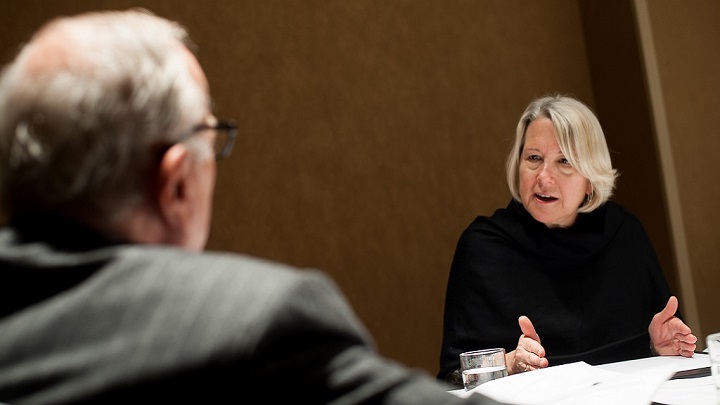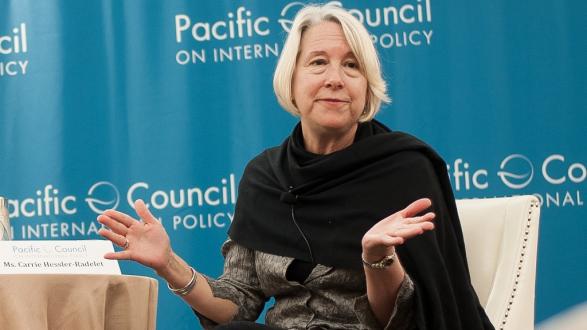In:
Since the establishment of the Peace Corps in 1961, over 220,000 Americans have served as volunteers in 140 countries. In a world where security and economic prosperity for all nations are inextricably linked, the Peace Corps aims to promote peace and friendship. What is the Peace Corps role in U.S. diplomacy abroad, and how does it respond and adapt to 21st century challenges?
Carrie Hessler-Radelet is the 19th Director of the Peace Corps and a fourth-generation returned Peace Corps volunteer. After her volunteer service in Western Samoa (1981–83), she went on to spend more than two decades working in public health, focusing on HIV/AIDS and maternal and child health.
At a recent Pacific Council event, member Steve Allen spoke to the Director about global development, security, health policy, and the mission of the Peace Corps. Mr. Allen served as a Peace Corps volunteer in the early 1960s in Turkey, where he taught in a high school and at Ankara’s Middle Eastern Technical University.
The following has been edited and condensed for clarity and length.
____________________
Steve Allen: What issue of global importance is not getting enough coverage?
Carrie Hessler-Radelet: That is a great question. I would say there is not enough coverage of all of the good that has happened in development throughout the past 25 years. It has been a period of economic growth – improvement of living conditions and of all manner of socio-economic standards. We have seen incredible progress in human development in nearly every country.
Many people today would say that the world is falling apart, but in fact it is quite the opposite: there have been improvements in maternal health in terms of decreasing maternal mortality, in rapidly decreasing child mortality, in lessening violence, and increasing the number of democracies that exist today. The truth of the matter is the world is far less violent now than it was 25 years ago. We have seen the greatest gains in development in human history.
Allen: The Peace Corps recently announced the suspension of its program in El Salvador due to security concerns. How frequently has this happened during your directorship? And how have security concerns impacted the recruitment of volunteers?
Hessler-Radelet: The most important thing for us is keeping our volunteers safe and secure. We use crime data from other countries and various international databases to help us decide where we can safely place our volunteers. We also have extensive communication with embassies and coordinate with the local security and police departments in the countries where we serve.
Allen: Do you have security groups within your in-country team?
Hessler-Radelet: We have a safety and security manager and we have Peace Corps regional security officers. However, security is everyone’s business. The most important thing is for volunteers to learn the local language, to understand the culture, and to really know their host community. That is how they can identify risky situations and can ask for help. Our safety strategy is immersion in the community, and it has worked very well for us for 50 years, but crime statistics are changing.
El Salvador is an example of a country where for many years we felt we could manage safety issues by placing volunteers in rural districts farther away from crime. Now there is increased narcotics trade and crime, and it got to the point where we felt we could no longer guarantee the safety of our volunteers. For example, our volunteers were working at girls’ or boys’ leadership camps where families didn’t feel safe allowing their volunteer to go outside their community. We were having after school programs where families felt they could not let their kids stay after school because of violence. We decided to suspend our programming when the security concerns prevented our volunteers from adequately doing their work.

We have left ten countries since I started, and out of those ten we have returned to five. Even after leaving we continually monitor these countries; we don’t close the programs, we suspend them. We are committed to those countries, and we will go back when the time is right. My hope and prayer is that we will be able to go back to El Salvador. Colombia – a positive example in Latin America – was one of the first countries we had to leave in the ‘90s. We returned in 2010 once we deemed it safe.
We provide our applicants with crime data for every country so that they can make the decision of where to serve. I believe that the increase in applications is due to the fact that volunteers can now choose to apply to particular countries and programs. We have also streamlined the process: a couple of years ago it would take eight hours to complete an application, now it takes about an hour. If you apply by April 1 you will get a decision by July 1 and will be in the country by November 1. We make the process transparent so that you can plan around your Peace Corps experience.
People understand there are risks in the world but we also have the infrastructures of the U.S. government to support us. We have phenomenal medical care and effective safety and security teams. However, I stress again, the most important thing in terms of safety and security is the volunteer’s language, cross-cultural skills, and their integration into the community.
Allen: Given your background in health policy, what innovative health programs have you been able to implement during your tenure as Director?
Hessler-Radelet: We are collaborating with a small NGO called Seed Global Health on a program called Global Health Service Partnership. Seed Global Health is group of physicians and nurses from the Mass General Hospital, and what we do is send doctors and nurses as Peace Corps volunteers to work in medical and nursing schools in four countries in Sub-Saharan Africa. The program started as result of the multiple requests we were getting from ministries of health to strengthen medical and nursing school education.
I spent my whole life working in public health and used to run a big public health firm where I would send doctors overseas. Typically for any USAID-funded project, the cost of sending an American doctor to work overseas is upwards of $450,000 a year. Peace Corps can send a doctor to Africa for the same cost as a Peace Corps volunteer – for roughly $50,000 a year.
Allen: Your mission statement states that a primary objective of the Peace Corps is to “help the people of interested countries in meeting their need for trained men and women.” Why, then, is the Peace Corps teaching English in China? China pays qualified people to teach English. It doesn’t seem to have a need.
Hessler-Radelet: Very good question. We have three goals at the Peace Corps: the first goal is exactly the one you mentioned; the second goal is to promote a better understanding of Americans on the part of the peoples served; and the third goal is to promote a better understanding of other peoples on the part of Americans. China is a major global partner and it is critically important for people in both countries to be able to talk to each other and understand each other. You can find commonalities and can then agree on issues that face all of humanity. We think that it’s important for Americans to speak Chinese and for the Chinese to speak English and understand the American perspective.
Allen: During your time as Director, have you spent a lot of time traveling to the various countries where the Peace Corps works?
Hessler-Radelet: I spend quite a lot of time traveling! It’s a great privilege not just because I get to see the country but because I get to see our volunteers in action. They are so inspiring and doing absolutely incredible work in places that are physically very difficult, but they are so happy, so dedicated, so motivated, and they are really making a difference. It’s incredibly inspiring; it makes me proud as an American.
____________________
Mr. Steve Allen is a member of the Pacific Council and a returned Peace Corp volunteer.
Ms. Carrie Hessler-Radelet was sworn into office as the 19th Director of the Peace Corps in June 2014. Follow her on Twitter: @PeaceCorpsDir.




